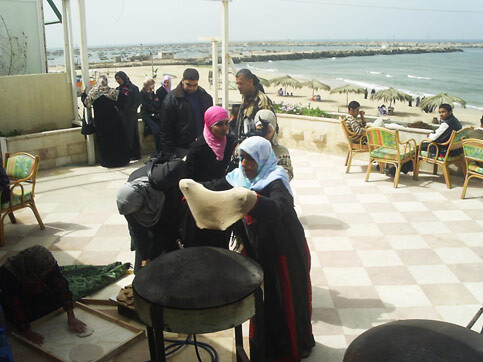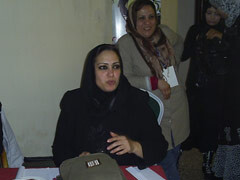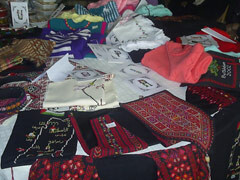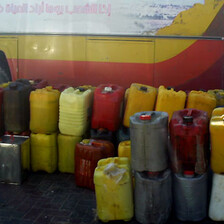Gaza Strip 20 March 2008

A Palestinian woman makes bread outside the festival near the seat at Gaza.
A few kilometers from where the Israeli army attacked Gaza’s coast, a coalition of 27 women’s organizations held a festival marking International Women’s Day. Organized by the Women’s Affairs Center based in Gaza City, the event titled, “Gaza women defy the Israeli siege,” was held at the Beach Hotel along the coast.
The hall overlooking Gaza’s shore is crowded with dozens of attendees and a number of booths selling various products. One woman sells traditional folk dresses, while another delivers homemade Palestinian foods, and another stand offers homemade accessories and household items.

Exhibit organizer Reem Elneerab.
Donya Al-Amal Ismail, a local journalist and a participant in the fair, believes that such an exhibition “helps women express their talents and creativity in a way that exposes an important aspect of Palestinian society in Gaza, despite the ongoing suffering of the population.” She adds that the exhibition faced a number of problems this year including “the lack of raw materials and people’s inability to make purchases at these difficult times.”

Traditional Palestinian embroidery made by women in Gaza.
She smiles and explains that “when I look at the eyes of my customers I can understand they want to buy, but they can not afford to buy. The situation has affected their ability to purchase.”
After Hamas took over Gaza last June, Israel imposed a harsh economic blockade on the coastal region. According to UNRWA, the UN agency for Palestine Refugees, more than 80 percent of Gaza’s 1.5 million residents depend entirely on food assistance that the organization provides.
As Ms. Al-Haddad observed, many Palestinians want to participate in events like the Women’s Day festival and purchase the crafts on display, however, they are unable to afford these items. Because of the siege even purchasing basic items like bread has become difficult.
Now Gaza’s local industries have been forced to shut down due to lack of raw materials and Israel’s closure of border crossings, leaving more than 70,000 local laborers jobless. Near the women’s exhibition of homemade craftwork and foods, the local chapter of the Committee for Breaking the Siege held a symbolic funeral procession for Gaza’s local factories. The procession drew hundreds of men who marched through Gaza City’s Kateeba district.
This is the situation in Gaza today: in the midst of the ongoing Israeli siege and attacks, Palestinians in Gaza feel a mixture of frustration and determination to continue with their lives.
Rami Almeghari is currently contributor to several media outlets including Palestine Chronicle, IMEMC, The Electronic Intifada and Free Speech Radio News. Rami is also a former senior English translator at and editor in chief of the international press center of the Gaza-based Palestinian Information Service. He can be contacted at rami_almeghari at hotmail.com.
All images by Rami Almeghari
Related Links





